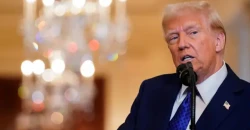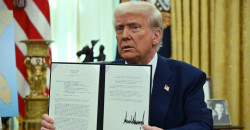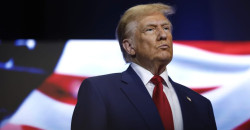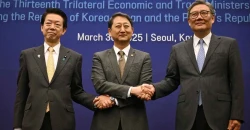Trump's tariffs begin: Trade tensions rise and Republican Pushback surfaces
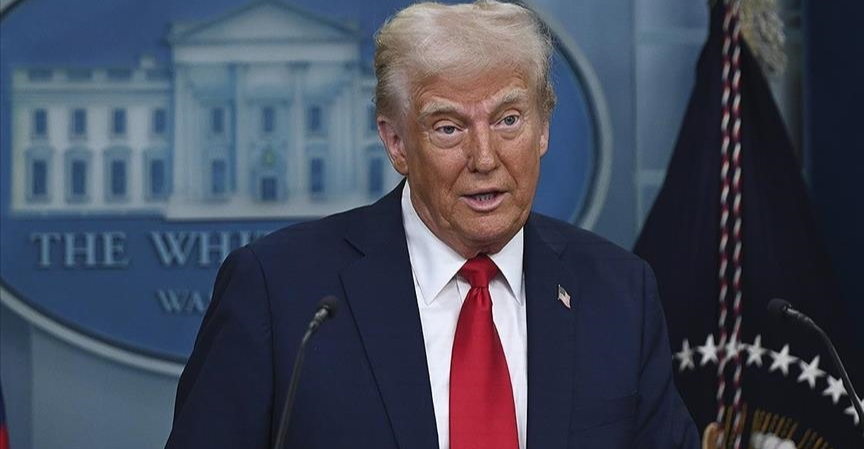
Shafaq News/ US President Donald Trump’s sweeping tariffs on dozens of countries came into force on Wednesday, including a 104% duty on Chinese imports, intensifying a global trade dispute as his administration prepares for talks with several nations.
The tariffs, which Trump has described as “reciprocal,” have disrupted long-standing trade norms, triggered recession concerns, and caused a sharp decline in global markets, according to economic experts.
The S&P 500 has lost nearly $6 trillion in market value since Trump announced the duties a week ago, marking its steepest four-day drop since the index was established in the 1950s. It is now approaching bear market territory, defined as a 20% fall from its recent peak.
Asian markets continued their slide on Wednesday. Japan’s Nikkei fell over 3%, South Korea’s won hit a 16-year low, and government bonds suffered significant losses as investors moved to cash.
US stock futures pointed to a fifth consecutive session of losses on Wall Street.
Trump has reportedly sent conflicting messages about the long-term future of the tariffs, calling them “permanent” while also suggesting they are prompting other leaders to seek dialogue. "We have a lot of countries coming in that want to make deals," Trump said at a White House event on Tuesday. He later added that he believed China would eventually seek an agreement as well.
Talks are planned with South Korea and Japan, two of Washington’s closest partners, and Italian Prime Minister Giorgia Meloni is expected in Washington next week. Vietnam’s Deputy Prime Minister, representing a major manufacturing hub heavily targeted by the tariffs, is scheduled to talk with US Treasury Secretary Scott Bessent on Wednesday.
Tariff Fallout and Global Response
Trump nearly doubled tariffs on Chinese goods, raising them from 54% to 104%, following Beijing’s announcement of retaliatory measures. China has condemned the move, calling it blackmail.
In response to the market turbulence, major Chinese brokerage firms have pledged coordinated efforts to stabilize domestic equities.
Other governments are taking steps to shield key sectors. South Korea announced emergency support for its auto industry, including tax breaks and subsidies.
Economists warn that US consumers may ultimately bear much of the burden, with higher prices expected across a wide range of goods. A recent Reuters/Ipsos poll found that nearly three-quarters of Americans anticipate rising prices in the next six months.
The immediate impact of the new tariffs may reportedly be delayed. Goods already en route to the US before the deadline will be exempt from the duties if they arrive by May 27.
Trump’s earlier 10% across-the-board tariffs on many imports took effect Saturday. The latest measures, imposed at 12:01 a.m. ET (0401 GMT) on Wednesday, target nations Trump accuses of “ripping off” the US. The list includes key allies such as the EU, which now faces a 20% duty alongside industry-specific penalties. The EU’s 27 members are expected to vote on initial countermeasures later in the day.
The US president has framed the tariffs as a response to foreign trade barriers that he says harm US businesses. He has also accused countries like Japan of currency manipulation, a claim Tokyo denies.
Japan’s finance minister said on Wednesday that upcoming trade talks with the US could include discussions on exchange rates.
Trump has indicated more tariffs may be on the horizon. Speaking to Republican lawmakers on Tuesday evening, he said he plans to announce “major” tariffs on pharmaceutical imports—one of the few sectors not yet affected.
Republican Pushback on Trump's Tariff Authority
A growing number of House Republicans are moving to challenge Trump’s authority to impose tariffs without congressional approval. At least twelve Republicans, led by Rep. Don Bacon (R-Neb.), are considering supporting a bill designed to limit presidential power over tariffs.
Rep. Bacon told Axios that two Republicans—Reps. Jeff Hurd (R-Colo.) and Dan Newhouse (R-Wash.)—have already signed onto the bill as co-sponsors. "I have 10 others who want to do it but they want to talk to the trade representative first,” he added.
The proposed bill would require any tariffs imposed by the president to expire after 60 days unless Congress approves them. It also allows Congress to overturn tariffs at any time through a resolution of disapproval.
Several Senate Republicans have introduced similar legislation, with more than half a dozen co-sponsoring a bill from Sens. Chuck Grassley (R-Iowa) and Maria Cantwell (D-Wash.).
Some Republican lawmakers have expressed concerns that while the tariffs have had positive effects in certain areas, they are harming farmers in their districts. One anonymous House Republican who plans to co-sponsor the bill said, "It's right there in the Constitution — we can have a bill to make it more specific — but Congress has a responsibility too to watch this.”
Despite Trump’s threat to veto the bill, Bacon has stated he is in no rush to push it to a vote, though he acknowledged that “as we study the stock market, inflation, unemployment, this may be a viable way.” Bacon added that he is considering a discharge petition to bypass leadership and force a vote if needed.
